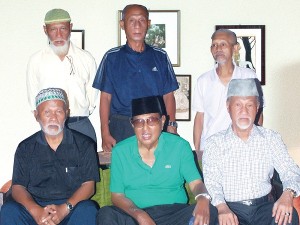
The heirs of the Sultan of Sulu: (seated from left) Rajah Mudah Agbimuddin Kiram, Sultan Jamalul Kiram III, Sultan Bantilan Esmail Kiram II and (standing from left) Datu Alianapia Kiram, Datu Phugdal Kiram and Datu Baduruddin Kiram. CONTRIBUTED PHOTO
MANILA, Philippines – “This is do or die,” Raja Muda Agbimuddin Kiram, brother of Sultan Jamalul Kiram III, told Radyo Inquirer 990 AM on Monday.
“I believe we are right [and] this place belongs to us. We will stay,” he added.
Even if the Philippine government has sent a vessel to bring the group home, Raja Muda insisted that the sultanate’s “Royal Security Force” would not leave Tanduao village in Lahad Datu town “until the issue is resolved.”
Malaysian online news agency, the Star, reported on Sunday that the Malaysian government has given the Sulu sultanate’s followers a 48-hour extension to leave the village.
Despite the deadline set by the Malaysian government, Raja Muda maintained that he and the royal army would remain in Tanduao to assert their claim on Sabah.
He said that the Malaysian officials they have spoken to were “convincing us to go back… and that this issue be discussed in Zamboanga.”
“I said, why should we bother? Why can we not talk here?” Raja Muda said.
Malaysia is paying the heirs of the sultanate 5,300 ringgit or around P77,000 per year as a token rent for Sabah.
Followers of the sultanate of Sulu occupied Tanduao village last February 9 and has resisted efforts of Malaysian authorities to drive them away from the area.
“We didn’t come here to make war or make trouble for the authorities or anybody here. We just want to live in our place… this place belongs to us,” said Raja Muda.
The Department of Foreign Affairs, in a recent statement, said that the government has sent a humanitarian ship from Tawi-Tawi to fetch the members of the Sultanate from the town of Lahad Datu.
The humanitarian vessel was expected to arrive in Sabah Monday afternoon but Raja Muda stood by his earlier statements that their decision was final.
“I have already given my statement that my decision and the decision of my brother is final,” he said.
The DFA also called on the royal army to “return to their homes and families”, expressing worry over the women and children who were part of the group.
Raja Muda confirmed that there were women with them, seven to be exact, but no children.
The presence of women, he said, would not also make them leave the disputed land.
For more of the interview, listen to Radyo Inquirer 990AM.

